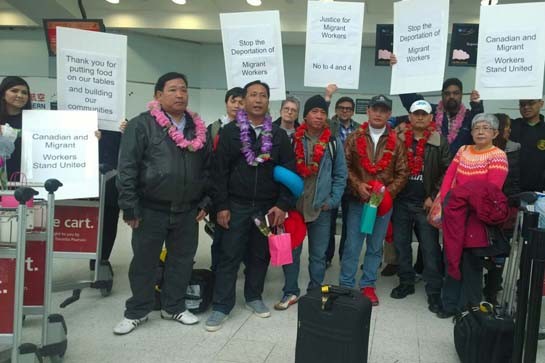
Duffygate will be remembered as perhaps the most damning scandal that dogged the Harper regime in the lead-up to the 2015 federal election.
It, and the intermittent barrage of media reporting around it, may have titillated some voters and boosted the ratings of a few mainstream news outlets, but the Conservative legacy is far more vile, far more nefarious, than a secret plan to repay $90,000 of one senator's disputed expenses.
Hidden just beneath the surface of all the election-speak is how irreparably the Conservative regime has damaged some of the most vulnerable people in our communities.
Canada's perpetual system of indentureship, the Temporary Foreign Worker Program, is a scourge. It — and the largest mass deportation in Canadian history — almost entirely ignored by the parties during the campaign, should be front and centre going forward.
Migrant-rights activists estimate that this year 70,000 migrant workers were forcibly removed from our shores. This due to the Harper regime implementing the "4 & 4" rule: It means that migrants in the "low-skilled stream" of the Temporary Foreign Worker program are limited to four years of working in Canada. After that, they are banned from working here for another four years.
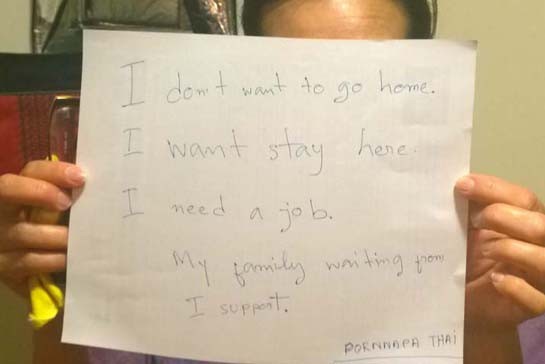
Scant, distorted and often misleading media coverage this year focused on the idea that hordes of migrant workers would suddenly become non-status and might therefore drain precious resources, rather than the significance of legally expelling and deporting tens of thousands of human beings.
But some media outlets, like the Toronto Star, did profile migrant workers themselves, workers like 46-year-old Somsha Chanchai, from Thailand, who worked in Ontario for 10 years before he was deported in April 2015.
A father of two boys, Chanchai names the implications of the 4 & 4 rule on his family: "The decision to ban us from working in Canada is unjust and unfair," he states. "I have put food on the tables of Canadians for so many years. Why would you create laws that penalize us?"
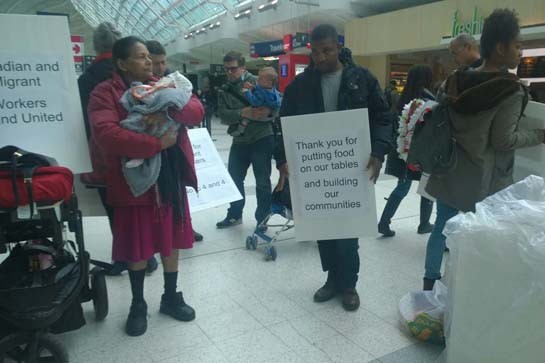
While no longer front page news, the mass deportations continue to impact scores of temporary foreign workers all across Canada.
In the summer, I met Angelo Martinez (whose name has been changed for this story). A migrant worker from Honduras who has worked in greenhouses in southwestern Ontario for seven years, he was scheduled to return home in late September.
Martinez faced a difficult choice: try to remain in Canada past September or return to Honduras and four years of almost-certain unemployment.
When I met him on a Sunday, in the city centre of the community where he worked, Martinez was clearly distressed. Speaking at a fast pace, he was gripped with anxiety about the two choices that lay before him. While some of the options I proposed put him at ease, none of them were a real remedy. None would enable him to continue working and earn a wage to support his family back home.
Chanchai and Martinez are only two of the countless voices excluded, two voices that should be listened to carefully, by politicians mapping the direction of Canada's migrant worker program.
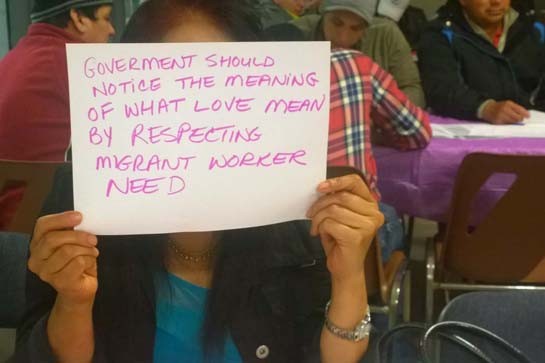
One can't help but feel a sense of helplessness when there are so few voices responding to Chanchai's last request before leaving Canada: Canadians, stand together with your fellow workers, migrant workers. Stand together to change the laws so we migrants can provide food for our families.
In spite of the deafening silence of all the political parties, migrant workers and their allies are organizing to demand their contributions not be obscured or erased.
Across Canada, migrant workers and allies have held rallies and workshops to express their opposition to the 4 & 4 rule.
Justicia for Migrant Workers has embraced a multi-prong strategy to engage workers and provide space to show their defiance.
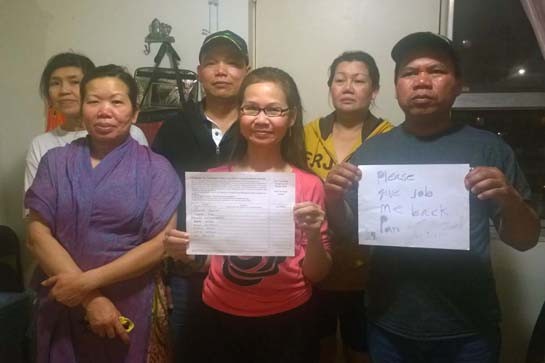
The 4 & 4 organizing has included:
* community workshops where migrant workers have come together to strategize about how to counter the 4 & 4 rule.
*a protest by migrant workers and allies outside the office of Citizenship and Immigration Minister Chris Alexander. An open letter written by migrant workers living in Durham was presented there.
*a social media campaign where hundreds of migrant workers sent messages to the Conservatives expressing their opposition to the 4 & 4 rule. Similar messages were sent by migrant allies from across Canada to stand in solidarity against the mass deportation.
*a community dinner and forum, held on the International Day for the Elimination of Racial Discrimination (March 21). The forum aimed to contextualize the deportation of migrant workers within the longer history of exclusions faced by racialized communities around the globe.
*airport solidarity parties to say goodbye to migrants affected by the 4 & 4 rule.
Future actions will include mass delegations descending on parliamentarians' offices. We will combine these with caravans and snake marches to continue the fight-back.
But we need to think beyond the election; we need to begin to dream, to think big when it comes to what we demand of the government.
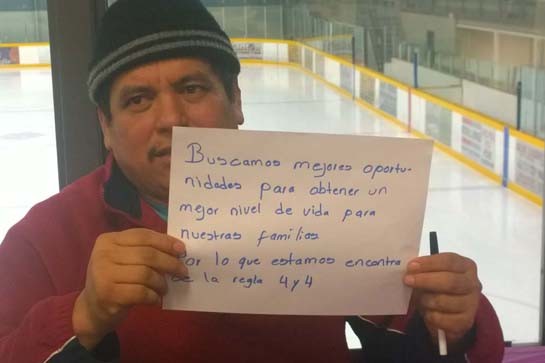
Community groups will call for a moratorium on the deportations of migrants.
They will demand status for migrant workers, thus removing immigration restrictions that render migrant workers vulnerable.
They will fight for a whole host of policy changes that will, at the very least, shift the discourse on migrant workers in Canada.
In the meantime, communities across the country will continue to deal with the fallout from mass deportations and the ongoing criminalization of migrants with precarious immigration status.
Recently at a house meeting, a community activist proposed creating our own Underground Railroad.
Larry Solomon, in his excellent book Roots of Justice: Stories of Organizing in Communities of Colour, notes that the Underground Railroad has provided a template, an essential organizing model, for so many activists in their battles for justice.
How can we establish our own vigilance committees and develop a network of railroad conductors to support migrant workers who refuse to be criminalized? How can we build power so that migrant workers are not forced into a position of being denied work or being denied status? How do we resist racist immigration policies and exploitative and deadly working conditions?
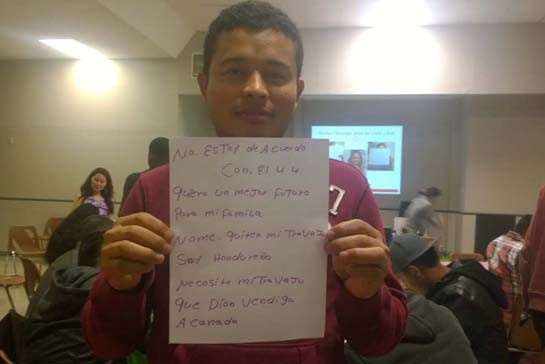
The Underground Railroad provides organizing strategies that help answer such questions. Those strategies combine moral, social, political and economic forms of resistance; forms of resistance that led to the downfall of slavery.
As a community, we owe Somsha Chanchai, Angelo Martinez and the hundreds of thousands of migrant workers who work and live in the margins. Our collective work should be to centre their actions, their resistance, at the forefront of our struggles.










